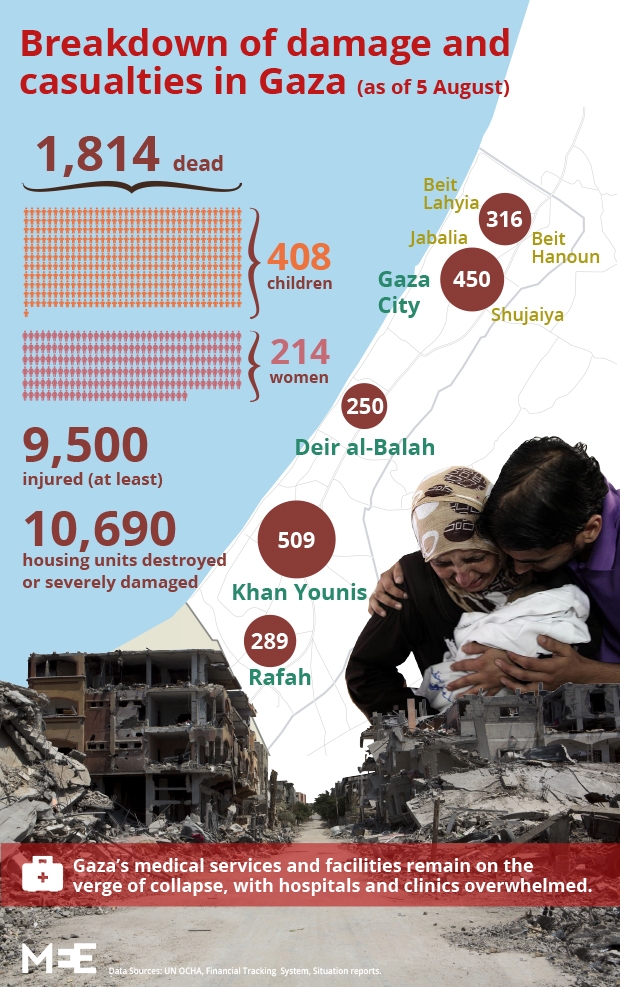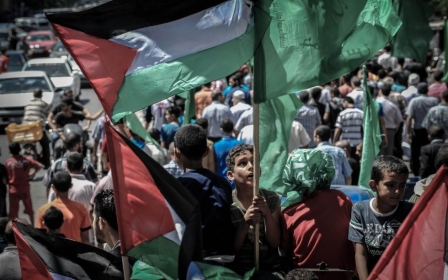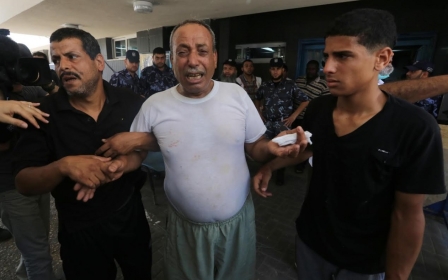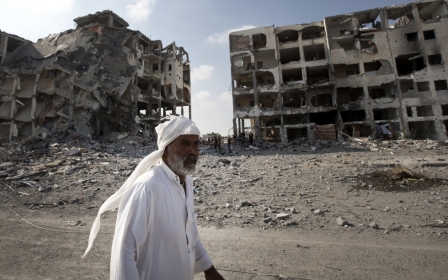Renewed Israeli strikes kill 5 in Gaza as West Bank uprising continues
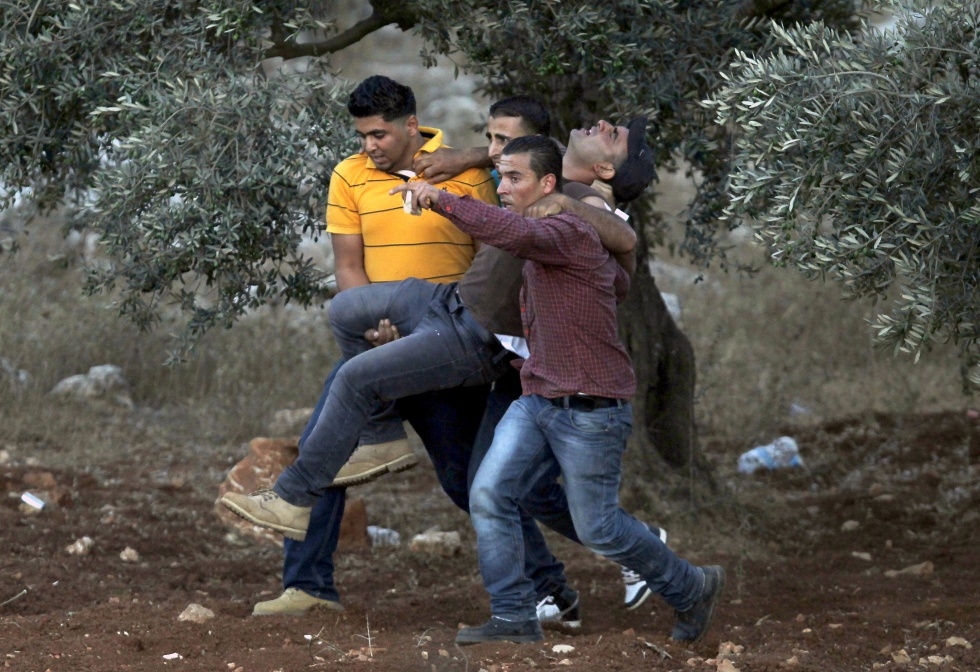
Israeli warplanes carried out 30 air strikes over Gaza on Saturday, killing five Palestinians, as militants fired six rockets into Israel, leaving international mediators scrambling to rescue ceasefire talks.
In the West Bank, following protests in support of Gaza on Friday that turned violent and killed two Palestinian men, a 'Day of Rage' protest, in conjunction with protests around the world, was scheduled with further clashes expected.
In Gaza overnight on Friday, emergency services said two men were killed in a strike on a motorcycle in Al-Maghazi camp and that the bodies of three others were pulled from the rubble of the Al-Qassam mosque in the Nuseirat camp in the middle of the enclave.
The Palestinian interior ministry said Israeli jets destroyed three mosques, the one in Nuseirat, one in the Zeitoun area and one in Jabaliya in the north. Only the minaret was left standing at the huge Al-Qassam mosque, an AFP photographer said.
"We heard a loud explosion and it was the beginning of the explosions and a warning to residents to evacuate the area to stay away," said Jood Irhaem, who lives close to one of the mosques.
"Minutes later there were two strong explosions."
Israel said Palestinian fighters fired six rockets into Israel on Saturday, bringing to 44 the number of projectiles launched since the end of a 72-hour truce on Friday.
One civilian and a soldier were wounded on Friday, but no injuries or damage were reported on Saturday.
Israel said it had carried out around 100 strikes in Gaza since Friday, 30 of them since midnight.
Palestinian medics say 10 people have been killed and more than 40 wounded since the truce expired.
In the occupied West bank, where rallies were held after Friday prayers in support of the Gaza Strip, two Palestinian men died after being shot by Israeli troops during violent clashes at protests in Hebron and near the Jewish settlement of Psagot, medics said.
Forty Palestinians were reportedly injured when the demonstrations in Hebron turned violent, Palestinian news agency Ma'an reported.
Smaller skirmishes with Israeli police were also reported in several villages in the Qalqiliya district where four Palestinians were injured.
The month-long conflict flared again after mediators tried but failed to extend a ceasefire that expired on Friday morning as Palestinian militants shattered the quiet with pre-dawn rocket attacks.
Fighting between Israel and Hamas has now killed at least 1,900 Palestinians and 67 people on the Israeli side, almost all soldiers, since July 8.
The United Nations says at least 1,354 of the Palestinians killed since July 8 were civilians, including 447 children.
Egypt, US still trying
Many Palestinians who had gone home during the ceasefire have returned to schools. Adnan Abu Hasna, a spokesman for the UN agency for Palestinian refugees, said 222,000 people we sheltering in 89 UN schools.
But combat has not resumed with the same fierce intensity, feeding hopes for a new truce.
"Our hope is that the parties will agree to an extension of the ceasefire in the coming hours," said State Department spokeswoman Marie Harf.
Acting US Middle East peace envoy Frank Lowenstein, in Cairo for some days, "is still trying to help the parties get a permanent ceasefire," a US embassy official said.
Egyptian mediators met a Palestinian delegation again Friday evening and were waiting to hear back from the Israelis after Shabbat, the Jewish sabbath, ends at sundown Saturday.
Israel warned it would not negotiate under fire, and Prime Minister Benjamin Netanyahu ordered the military to retaliate "forcefully" and blamed Hamas for breaching the ceasefire.
In southern Israel, the army has banned gatherings larger than 500 people within 40 kilometres (25 miles) of Gaza, and said kindergarten and summer camps could only operate if there was a bomb shelter nearby.
Pressure group Peace Now has called on supporters to rally on Saturday night in Tel Aviv against the war and to call for a diplomatic solution.
The Campaign for Boycott, Divestment and Sanctions (BDS) has called for an international 'Day of Rage' to demand an end to arms deals with Israel and support the divestment movement.
"Today's huge mobilisations show that the people of the world stand united in support of the rights of Palestinian people and against international complicity with Israel's on-going massacre of Palestinians in Gaza," said Dr Haidar Eid, a steering committee member of the Palestinian Campaign for the Academic and Cultural Boycott of Israel who lives in Gaza.
'Bibi too strong': Obama
President Barack Obama told The New York Times in an interview published Saturday that there were limits to US influence on both sides to reach a solution to the decades old Israeli-Palestinian conflict.
Netanyahu had a strong support base in Israel and Palestinian president Mahmoud Abbas was weak domestically, he said.
"If he (Netanyahu) doesn't feel some internal pressure, then it's hard to see him being able to make some very difficult compromises, including taking on the settler movement," Obama was quoted as saying.
"In some ways, Bibi is too strong (and) in some ways Abu Mazen is too weak to bring them together."
Hamas and Palestine Liberation Organisation officials want the lifting of Israel's eight-year blockade of Gaza and the building of a sea port.
They also want Israel to free 125 key prisoners.
A British, French and German proposal to rebuild Gaza aims to strengthen the hand of Abbas and his Palestinian Authority while clamping down on Hamas and other Gaza militants to ensure Israel's security.
New MEE newsletter: Jerusalem Dispatch
Sign up to get the latest insights and analysis on Israel-Palestine, alongside Turkey Unpacked and other MEE newsletters
Middle East Eye delivers independent and unrivalled coverage and analysis of the Middle East, North Africa and beyond. To learn more about republishing this content and the associated fees, please fill out this form. More about MEE can be found here.


